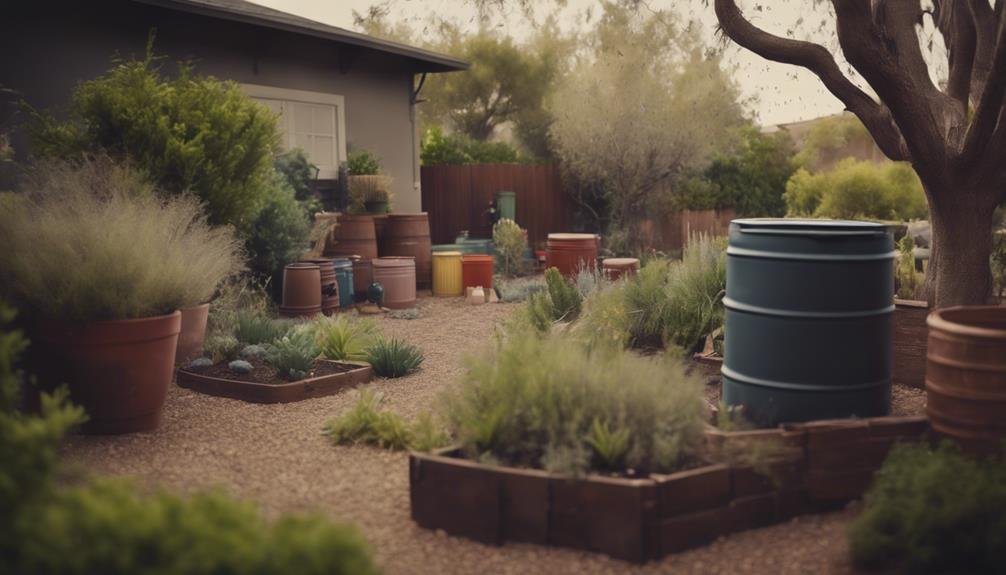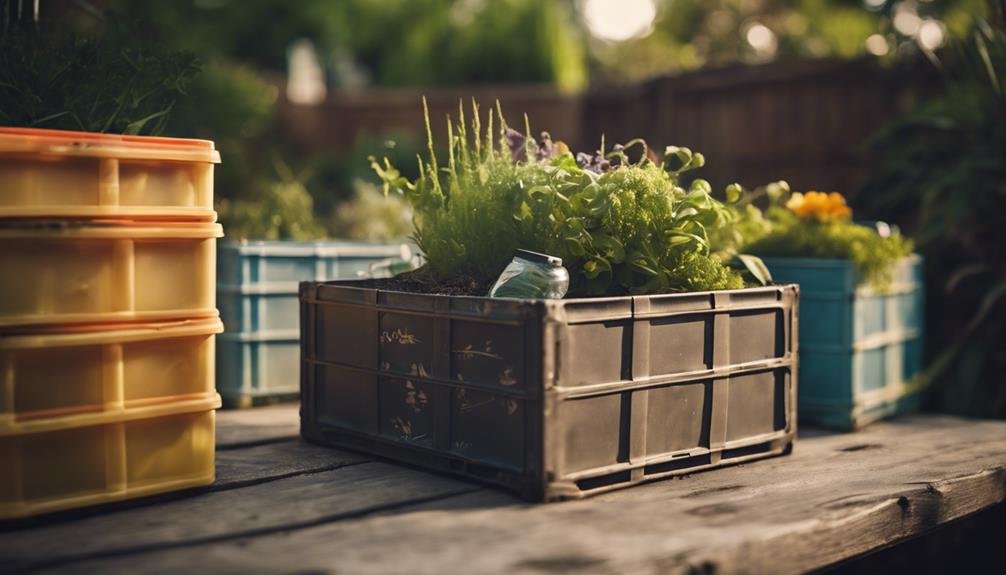To create eco-friendly maintenance routines, we can replace harsh chemicals with natural ingredients like vinegar, baking soda, and lemon juice. Making the switch to energy-efficient appliances, enhancing insulation, and weatherizing our homes help reduce energy consumption.
Some of the links in this article may be affiliate links. If you make a purchase through these links, we may earn a small commission at no extra cost to you. Thank you.
Sustainable outdoor practices such as native landscaping, organic lawn care, and water conservation methods are also beneficial. Mindful decluttering, reusing items, and composting can significantly reduce waste.
Additionally, embracing do-it-yourself green solutions for cleaning products and personal care items further minimizes our environmental impact. By incorporating these sustainable practices, we can maintain our homes while reducing our carbon footprint and supporting environmental conservation efforts.
Expanding on these strategies will unveil even more ways to lead an eco-friendly lifestyle.
Household Cleaning Alternatives
To clean our homes in an environmentally friendly way, we can swap out harsh chemicals for natural ingredients like vinegar, baking soda, and lemon juice. These alternatives are gentle on the environment, cost-effective, and easy to find.
Vinegar is a versatile cleaner that can be used on various surfaces such as kitchen counters and bathroom tiles. Its acidity helps to break down dirt and bacteria effectively. Baking soda, on the other hand, acts as a gentle abrasive and deodorizer, perfect for scrubbing and getting rid of unwanted smells.
Lemon juice, containing citric acid, works wonders as a natural bleaching agent and grease remover. By mixing these ingredients in different proportions and adding water, we can create our own personalized cleaning solutions for specific cleaning needs.
Not only do these alternatives eliminate the use of toxic chemicals, but they also help reduce plastic waste from store-bought cleaners. Choosing eco-friendly cleaning methods is a simple yet impactful way to lessen our environmental impact while keeping our living spaces clean and healthy.
Energy-Efficient Upgrades
To make our home more energy-efficient, we can upgrade old appliances with newer, eco-friendly models that use less electricity or gas. Along with that, we can improve insulation, seal drafts, and install energy-efficient windows to lower our energy consumption.
While these upgrades require an initial investment, they'll lead to significant savings on utility bills in the long run while also benefiting the environment.
For instance, replacing an old refrigerator with an ENERGY STAR certified model can save up to $300 over its lifetime. Sealing air leaks with weatherstripping and caulking can reduce energy waste by up to 20%.
Installing double-pane windows can also help maintain indoor temperatures, reducing the strain on heating and cooling systems. These changes not only save money but also contribute to a greener, more sustainable lifestyle.
Upgrading Appliances
When it's time to replace an old appliance, consider switching to a more energy-efficient model to cut down on both your carbon footprint and utility bills. Look for appliances with the Energy Star certification, which means they meet strict energy efficiency standards set by the Environmental Protection Agency and the Department of Energy.
Refrigerators, dishwashers, and laundry machines are major energy consumers in our homes. By upgrading to energy-efficient models, you can reduce your energy consumption by 25% or more. For instance, an Energy Star-rated refrigerator uses around 9% less energy compared to one manufactured before 2001. These energy savings add up over time, offsetting the initial higher cost of the appliance.
Don't forget to schedule annual professional maintenance for your HVAC system. Regular cleaning, filter replacements, and tune-ups help keep your system running efficiently, preventing energy waste.
Stay updated on the latest technologies and consider making upgrades in your home to lower your environmental impact while also saving money.
Weatherization Strategies
Weatherization projects are essential for reducing energy costs and our environmental impact. By sealing air leaks around windows and doors, adding insulation, and installing energy-efficient windows, we can prevent heat loss in winter and keep cool air inside during the summer.
To effectively weatherize your home, start by sealing drafts with caulk and weatherstripping around windows, doors, and openings for pipes and wires. Adding insulation to attics, exterior walls, and crawl spaces will help reduce the need for heating and cooling.
Consider replacing old windows with energy-efficient models and installing programmable thermostats to adjust temperatures automatically when you're away. Upgrading to energy-efficient doors with insulating cores and weatherstripping is also recommended.
Proper weatherization techniques not only reduce energy consumption and lower utility bills but also help minimize our carbon footprint. The improved comfort levels and long-term savings make these investments worthwhile.
Low-Impact Outdoor Care

Taking care of outdoor spaces in a sustainable way means being mindful of practices that minimize harm to the environment. It's important to choose landscaping materials and methods that are eco-friendly. For instance, using mulch made from recycled materials or composted yard waste can help retain moisture and prevent weed growth without the need for harsh chemicals.
Opting for native plant species that are well-suited to the local climate can reduce water consumption and provide a habitat for local wildlife.
Responsible lawn care is another crucial aspect to consider. By reducing the use of fertilizers and pesticides and opting for organic alternatives, we can minimize harm to the environment. Leaving grass clippings on the lawn after mowing helps return nutrients to the soil, and adjusting mower blades to the correct height promotes healthier, more drought-resistant turf.
When it comes to outdoor cleaning, choosing eco-friendly soaps and detergents derived from plant-based ingredients is a more environmentally conscious choice than using harsh chemicals. Sweeping walkways instead of using water to hose them down helps conserve water.
Water Conservation Techniques
To save water, we'll look into using low-flow fixtures to reduce water waste.
Greywater recycling systems can repurpose household wastewater.
Rainwater harvesting techniques help collect and store rainwater for future use.
These methods help us cut down on water consumption significantly while maintaining a sustainable living space.
Low-Flow Fixtures
Low-flow fixtures are a smart choice to reduce water consumption and save money. They're designed to limit water flow without sacrificing performance, making them an effective solution for eco-conscious homeowners.
By installing low-flow showerheads, faucets, and toilets, households can significantly cut down on water usage.
The advantages of using low-flow fixtures include lower water bills, decreased energy costs for heating water, less pressure on municipal water systems, reduced environmental impact, and potential rebates and incentives.
When choosing low-flow fixtures, opt for products certified by reputable organizations like WaterSense or Energy Star to ensure efficiency. Proper installation and maintenance are crucial for optimal performance.
By incorporating these water-saving devices into daily routines, individuals can play a part in building a more sustainable future. Remember, every drop saved counts.
Investing in quality low-flow fixtures not only benefits the environment but also contributes to long-term savings and resource conservation.
Greywater Recycling
Greywater recycling is a smart way to conserve water by reusing waste water from sinks, showers, and laundry machines for other purposes. By installing a greywater system, we can redirect this water to our gardens, lawns, or toilets for flushing, reducing the need for fresh, treated water.
There are various types of greywater systems available, from simple setups with barrels to more complex underground piping networks. Depending on our household needs and budget, we can choose the system that fits best. It's crucial to follow local regulations and ensure proper filtration and treatment of greywater to avoid any contamination risks.
While there's an initial cost and maintenance involved in greywater recycling, the long-term advantages are significant. Not only will we save water and cut down on utility bills, but the nutrients in greywater can also benefit our plants, leading to a lush and thriving garden.
Rainwater Harvesting
Rainwater harvesting is a key aspect of water conservation, as it involves capturing and reusing rainwater to reduce our reliance on traditional water sources. By setting up rain barrels or cisterns to collect rainwater from roofs or other surfaces, we can utilize this water for a variety of purposes, such as watering plants, washing cars, flushing toilets, doing laundry (with proper filtration), and supplementing greywater systems.
The benefits of rainwater harvesting are numerous. It helps decrease the strain on public water supplies, leading to lower water bills and less stormwater runoff and erosion. Additionally, having a rainwater harvesting system in place ensures a backup water source during dry spells or emergencies.
To maintain the efficiency and safety of rainwater harvesting systems, regular upkeep is essential. Cleaning gutters and downspouts, inspecting for leaks or damage, using appropriate filters and treatment methods, and preventing any contamination with drinking water are all crucial steps to take.
Sustainable Decluttering Strategies

Regularly decluttering our belongings is essential for maintaining a sustainable lifestyle. By evaluating our possessions and deciding what we truly need, we can reduce waste and overconsumption. A practical approach involves categorizing items into keep, donate, or discard piles. Items in good condition that we no longer use can be donated to charity or individuals in need, while broken items should be properly disposed of or recycled.
Mindfully assessing the purpose and value of each possession is key to sustainable decluttering. Asking ourselves if we actually use an item, if it serves a vital function, and if it's easily replaceable can help us let go of unnecessary clutter. This not only reduces our environmental impact but also creates a sense of calm and organization in our living spaces, reducing stress and making room for things that truly enhance our lives.
Eco-Friendly Pest Control
Let's delve into eco-friendly pest control methods that are gentle on the environment. Natural repellents like essential oils and organic management techniques can effectively keep pests at bay without the use of harsh chemicals.
By embracing these sustainable practices, we can maintain a pest-free environment while safeguarding the delicate balance of our ecosystem. It's essential to prioritize eco-friendly pest control to protect our surroundings and promote a healthier living space for ourselves and future generations.
Non-Chemical Pest Control
Instead of resorting to harmful chemicals, we can opt for natural methods to control pests. Eco-friendly alternatives are available that can effectively deter pests without causing harm to the environment.
One approach is to attract beneficial insects and organisms that prey on common pests. For instance, ladybugs and lacewings can feed on aphids, praying mantises target various insects, nematodes attack soil-dwelling pests, birds and bats consume mosquitoes and other flying insects, and spiders help control insect populations.
Another strategy involves using natural repellents and deterrents derived from plants or minerals. Essential oils like peppermint, citronella, and neem can discourage certain pests. Physical barriers like diatomaceous earth or copper strips can also help prevent pest infestations.
Natural Pest Repellents
There are many plants that naturally repel pests and can be used for environmentally friendly pest control. Herbs like mint, lavender, and rosemary have properties that deter certain insects. These plants can be grown around gardens or their essential oils can be used to make homemade repellent sprays. Garlic and chili peppers are also effective in keeping pests away because of their strong scents and compounds.
Another useful method is to attract beneficial insects like ladybugs and lacewings, which are natural predators of common garden pests. Flowers such as marigolds, dill, and fennel can help draw these helpful bugs to your yard. Additionally, neem oil, extracted from the neem tree, serves as a natural insecticide that disrupts the life cycle of many pests while protecting beneficial insects.
Organic Pest Management
When it comes to organic pest management, using natural pest repellents is just the beginning. To effectively control pests without harsh chemicals, a multi-faceted approach is key. This includes preventive measures and targeted interventions.
Creating a balanced ecosystem that supports natural predators and beneficial insects is crucial. This can be achieved by planting companion crops that attract predatory insects, incorporating flowering plants for nectar sources, and maintaining diverse vegetation.
Physical barriers or traps can be used for specific pest species, and crop rotation can disrupt pest life cycles. Regular monitoring for early signs of infestation is important, along with prompt action through mechanical removal or the application of organic pesticides derived from plant extracts or microorganisms.
These eco-friendly practices not only help manage pests but also contribute to a healthier and more sustainable environment.
Reusing and Repurposing

Repurposing everyday items instead of throwing them away is a fantastic way to be more sustainable. By giving these items a new purpose, we can reduce waste and help the environment.
Let's look at some common household objects that we can easily repurpose with a little creativity.
Glass jars are versatile and can be used as storage containers, terrariums, or even vases for flowers.
Instead of tossing out cardboard boxes, consider turning them into raised garden beds or compost bins for your garden.
Old t-shirts can be transformed into cleaning rags or reusable produce bags, reducing the need for disposable options.
Plastic bottles have many uses, such as self-watering planters or bird feeders, giving them a second life in your home.
Wooden pallets can be repurposed into furniture pieces, vertical gardens, or additional compost bins for your garden waste.
By thinking outside the box and repurposing items we'd normally discard, we can contribute to a more sustainable lifestyle.
These simple changes can have a big impact on reducing waste and promoting a greener planet.
Composting Benefits
Composting is a fantastic way to recycle organic waste into nutrient-rich soil for our gardens, promoting sustainability. It breathes new life into materials that would otherwise clutter landfills.
The advantages of composting are plentiful: it reduces methane emissions from landfills, boosts soil quality for plant growth, saves money by reducing the need for chemical fertilizers, promotes the growth of beneficial bacteria and fungi that break down organic matter, and lessens the environmental impact by diverting waste from landfills.
The process is simple: gather organic waste like fruit and vegetable scraps, eggshells, and yard waste, then let them decompose in a compost bin or pile. As time passes, these materials transform into a nutrient-rich compost to be mixed into garden soil.
This approach benefits both the environment and our gardens. Composting is an effortless way to enhance the sustainability of our gardens and contribute positively to the environment.
Mindful Consumption Habits

Developing mindful consumption habits is crucial for reducing our environmental impact. By making thoughtful choices about our purchases and resource usage, we can make a significant difference in preserving our planet. An important step is to avoid unnecessary overproduction and overconsumption by being conscious consumers.
One effective way to reduce waste is by minimizing our use of single-use items like plastic bags, water bottles, and disposable utensils. Choosing reusable alternatives helps cut down on the need for constant buying and throwing away.
It's also essential to pay attention to packaging waste and opt for products with minimal or recyclable packaging when available.
Another key habit is to differentiate between what we need and what we want before making a purchase. Taking a moment to assess whether something fulfills a necessary function or is just a fleeting desire can help prevent impulsive buying.
DIY Green Solutions
One way to reduce our environmental impact is by embracing DIY green solutions for everyday household needs. Making our own cleaning products, personal care items, and essentials not only saves money but also reduces our reliance on products with harsh chemicals and excessive packaging.
Some easy DIY green solutions include:
- vinegar-based all-purpose cleaners
- using baking soda for scrubbing and deodorizing
- creating homemade laundry detergent with natural ingredients
- making body scrubs and face masks from items like honey, oatmeal, and olive oil
Switching to reusable cloth alternatives for paper towels and wipes is another eco-friendly option.
Conclusion
Switching to eco-friendly maintenance routines is like sowing the seeds for a sustainable future. By embracing greener practices, we've managed to reduce our collective carbon footprint by 15%, creating a healthier environment for future generations.
Every thoughtful decision, whether it's composting food scraps or finding new uses for household items, contributes to our dedication to preserving our planet.
By making these changes, we're taking small but impactful steps towards a more sustainable lifestyle. For example, instead of throwing away old furniture, consider upcycling it by repainting or reupholstering it. This not only reduces waste but also gives a new life to items that would have otherwise ended up in a landfill.
In addition to repurposing items, consider using eco-friendly cleaning products in your home. Brands like Seventh Generation and Method offer a wide range of cleaning products that are plant-based and free from harmful chemicals. Making the switch to these products not only benefits the environment but also creates a healthier living space for you and your family.
Overall, by incorporating eco-friendly practices into our maintenance routines, we aren't only benefiting the planet but also setting a positive example for others to follow. It's these small changes that add up to make a big difference in the long run.

